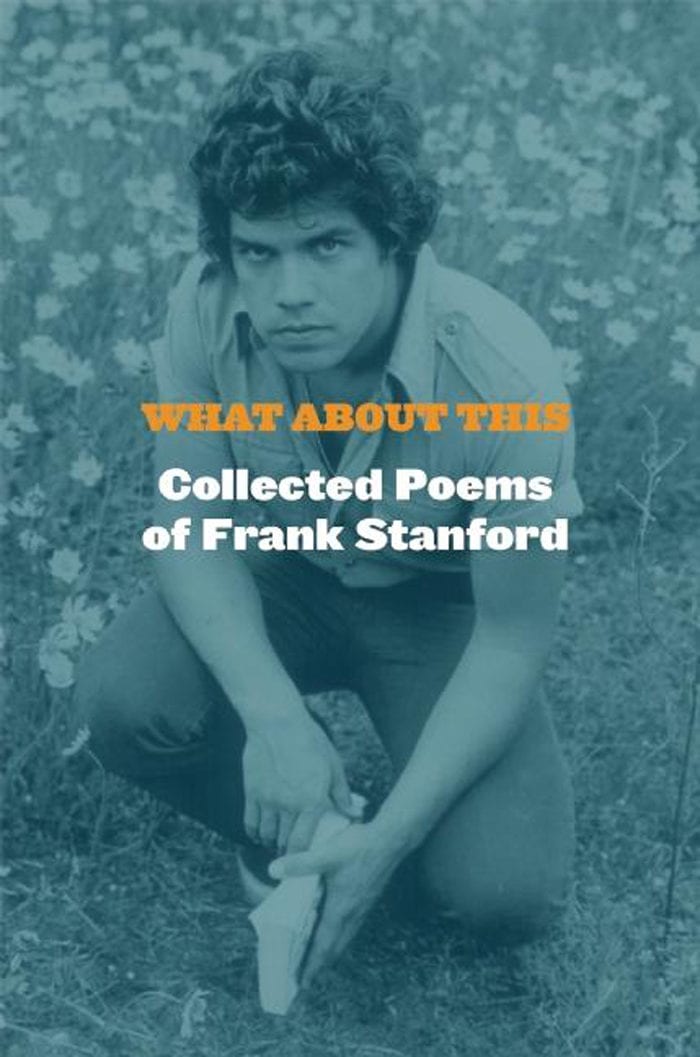
Michael Ondaatje writes of this volume: “Frank Stanford died in 1978, but his writing has been almost a secret or an unknown force in American Poetry. So it is wondrous to see this first big collection and to discover the range and power of his work that belongs somewhere between the blue yodels of Jimmie Rodgers and the electric blues of Arthur Big Boy Crudup and in the youthful company of Shelley. His poems can leap from a levee to an eyelash in half a line.”
The poetry of Frank Stanford is decidedly local, Southern, rural, consumed by dreams, and saturated with a hunger for justice, love, and death. Vehemently romantic, his poems are enlivened by the poor and the held-down and -apart. The young, the wild, and the disenfranchised guide it toward transcendence.
ISBN: 9781556594687
Format: Hardcover
The Quiver
Come back dull and bloody all of you
let it hold the shame inside
itself like a helmet
bring a little soil each time
for a pillow
you aren’t as many as you were
Reviews
“The big event in poetry for 2015 will likely be the long-awaited resurrection of Frank Stanford, a legendary badass from Arkansas, much of whose poetry has been unavailable since his suicide at the age of 29 in 1978… Stanford was a hell of a metaphor-maker and simile-slinger, and could cast a spell of extreme intensity with a flick of his wrist.” —NPR
“What About This… introduces to a broader audience an important and original American poet—sensitive, death-haunted, surreal, carnal, dirt-flecked and deeply Southern—whose promise, only partly fulfilled, it hurts to contemplate. His poems flick on a heretofore unnoticed porch light in your mind.” —Dwight Garner, New York Times
“Stanford fearlessly explored the terror and wonder of the mind and the physical world.” —Publishers Weekly, starred review
“Highly recommended work from an American original.” —Library Journal, starred review
“[What About This], layered with north Delta dialect and superstition, departs again and again on dream-like thought sequences in which unpredictable imagery continually startles the imagination and overwhelms it with visceral beauty.” —Matthew Henricksen, Arkansas Times
“Frank Stanford’s What About This is a monumental achievement. So much of Stanford’s work was unpublished, scattered about in limited-edition, hard-to-find volumes, but now it has been collected and readers will rejoice to discover (or rediscover) a distinct poetic voice… He was a voracious reader and was heavily influenced by Thomas Merton and French writers. He loved the Surrealists and Rimbaud, Mallarme, Follain and the French filmmakers Cocteau and Buñuel. His poetry is wildly imagistic, imbued with Southern folklore and culture, and it’s—to use Stanford’s own word—‘strange.’” —Tom Lavoie, Shelf Awareness
“What About This marks a rare moment, when a critical and completely original American voice is recovered after decades and takes its rightful place in the canon… Now that the work is finally available, the real risk is that Stanford’s poetic legacy will play second fiddle to the myth of his life and death. The beautiful young suicide is a hard narrative to shake… What About This offers the fullness of both the work and the image, and leaves it to readers to decide what they will value most.” —Jay Deshpande, New Republic

